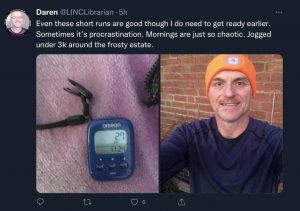By Daren Mansfield
When my taekwondo sessions ended and the local leisure centre was closed during the first lockdown, and we had to work from home, I thought the world had ended. All routine was suspended. Confined to home I felt isolated and became more increasingly aware of my mental health.

Gradually there was hope in little signs appearing here and there. The drop in the levels of traffic, no aircraft shuttling back and forth from nearby East Midlands airport and the slow emergence of wildlife: from peregrine falcons to red kites soaring above and an easing of pollution. Silent skies and noiseless roads. It felt like a resurgence: nature defiantly fighting back after Millenia. That spring was unseasonably warm, and my children enjoyed playing in the garden. My son turned part feral, released from the strictures of schooling and the need to be somewhere. I dug two wildlife ponds for the smooth newts that bred annually in an ornamental pond.
Then I started to worry about the dreaded ‘beep’ test and my declining fitness levels. If we went back to taekwondo now, how would I cope? Like many others On YouTube at that time we joined Joe Wicks’ daily workout routine in front of the TV. It wasn’t enough – I needed to be outside.
I started running up and down the garden, like a form of circuit training for the enclosed, carving a path that led nowhere. Once I ran over three hundred laps of the garden. I lost count. Exercise would be a productive way of releasing anxiety which bubbled away in my belly.
Ever since I was a kid in New Zealand when John Walker was Olympic champion, I loved running. Leave children in a playground and what do they do? Run and chase each other. It is only when we are older that we grow out of that spontaneity. We were born to run. We are, after all, endurance animals that have evolved as a pursuit predator over millions of years. In evolutionary terms, we have only just stopped (O’Dwyer, 2018).
Benefits of exercise
The benefits of exercise to mental health are well-founded as the Mind (2022) website cites we can experience:
- better sleep – by making you feel more tired at the end of the day.
- happier moods – physical activity releases feel-good hormones that make you feel better in yourself and give you more energy.
- managing stress, anxiety or intrusive and racing thoughts – doing something physical releases cortisol which helps us manage stress.
- being physically active also gives your brain something to focus on and can be a positive coping strategy for difficult times.
Relieving stress and anxiety
After reading these points, I asked myself ‘is there a way of channelling stress and anxiety’? Surely energy needs to be channelled somewhere. Furthermore, in various clinical studies Lin & Kuo (2013) found that endorphins, noradrenaline and serotonin are released during exercise, improving brain function, and even suggest works against neurological disorders. It worked for me. I felt lighter.
Joining clubs and a sense of belonging
In addition to simply jogging, there are benefits to joining a sports club and fostering a sense of belonging (Thomas, et al., 2017). Despite feeling that undertaking taekwondo has felt like acquiring a second job at times, I feel a keen sense of loyalty to the club and belief in one of the central tenets – perseverance. Not giving up when I wanted the ground to open beneath me when I repeatedly got a move wrong. It has, however, kept me fit and healthy, while learning self-control and discipline along the way.
Recently my son and I have joined a kickboxing club in addition to our joint membership of the taekwondo club. Kickboxing is a great stress buster when you get into the rhythm of various kicking and punching combinations. We are grading soon to get our first belt to embark on an inexorably slow climb up the ranks. The reward will be worth it.
Perhaps we look at things differently following our experiences of the Covid-19 pandemic. My lockdown insight is that I am healthier by channelling my mental health through regular exercise and belonging to martial arts clubs that unequivocally focus on the mind and body.
(In memory and dedicated to Caspar Capel who loved to run)
References
Lin, T.W. and Kuo, Y.M. (2013) Exercise benefits brain function: the monoamine connection. Brain Sciences, 3(1), 39-53. Available from https://www.ncbi.nlm.nih.gov/pmc/articles/PMC4061837/ [accessed 17th January 2022].
Mind (2022) Physical activity and your mental health. Available from https://www.mind.org.uk/information-support/tips-for-everyday-living/physical-activity-and-your-mental-health/about-physical-activity/ [accessed 17th January 2022].
O’Dwyer, L. (2018) Why humans are optimised for endurance running, not speed. Available from https://www.theguardian.com/science/blog/2018/mar/14/why-humans-are-optimised-for-endurance-running-not-speed [accessed 17th January 2022].
Thomas, W.E., Brown, R., Easterbrook, M.J., Vignoles, V.L., Manzi, C., D’Angelo, C. and Holt, J.J. (2017) Social identification in sports teams: the role of personal, social and collective identity motives. Personality and Social Psychology Bulletin, 43(4), 508-523. Available from https://proxy.library.lincoln.ac.uk/login?url=https://search.ebscohost.com/login.aspx?direct=true&db=edsgao&AN=edsgcl.491272204&site=eds-live [accessed 17th January 2022].
United Taekwondo (2022) Five tenets of taekwondo. Available from: https://utkd.org/for-students/five-tenets [accessed 19th January 2022].